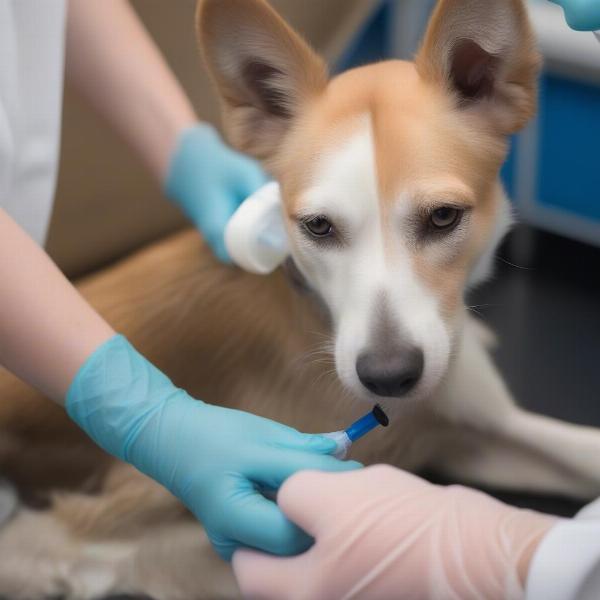Surgical glue, also known as tissue adhesive, is a medical adhesive used to close wounds and incisions in both humans and animals, including dogs. It offers a convenient and sometimes less invasive alternative to traditional sutures or staples, especially for certain types of injuries. This article will explore the uses, benefits, and potential drawbacks of surgical glue for dogs, providing you with a comprehensive understanding of this modern veterinary practice.
What are the advantages of using surgical glue for canine procedures? Surgical glue offers several benefits including faster application, reduced pain, and minimized scarring. It also eliminates the need for suture removal, saving you a trip to the vet. Let’s delve deeper into the specifics of using surgical glue for your furry friend.
Understanding Surgical Glue for Dogs
Surgical glue is a type of cyanoacrylate adhesive that creates a strong bond when it comes into contact with moisture on the skin. It’s important to note that not all glues are suitable for surgical use in dogs. Your veterinarian will select a specific type of sterile, medical-grade glue designed for tissue adhesion. This glue is biocompatible, meaning it’s safe for use in living tissue and designed to break down naturally as the wound heals.
 Applying Surgical Glue to a Dog Wound
Applying Surgical Glue to a Dog Wound
Why might a vet choose surgical glue over stitches? Sometimes, the location or nature of the wound makes suturing difficult. Glue can be an excellent option in these situations, providing a secure closure.
Benefits of Using Surgical Glue in Dogs
Surgical glue offers a range of advantages compared to traditional suturing:
- Faster application: Applying surgical glue is significantly quicker than placing sutures, reducing the time your dog spends under anesthesia.
- Less painful: Glue application is less invasive than suturing, minimizing post-operative pain and discomfort for your pet.
- Reduced scarring: Surgical glue can lead to less noticeable scarring compared to stitches.
- Antimicrobial properties: Some surgical glues have antimicrobial properties, helping to prevent infection at the wound site.
- No suture removal: A major advantage of surgical glue is that it doesn’t require removal. It degrades naturally as the wound heals.
Is surgical glue appropriate for all types of wounds on dogs? Not all wounds are suitable for surgical glue. Deep wounds or wounds in areas of high movement might require stitches for optimal healing. Your vet will determine the best closure method based on your dog’s individual needs.
When is Surgical Glue Used in Dogs?
Surgical glue is commonly used for closing small to medium-sized, clean lacerations. It is particularly well-suited for wounds located on areas with minimal skin tension, such as the face, ears, and legs. It can also be used in conjunction with traditional sutures or staples for more complex wounds.
What are some common scenarios where vets use surgical glue on dogs? Think small cuts, skin biopsies, or even some dental procedures. However, it’s important to remember that deep puncture wounds or injuries involving joints usually require stitches.
Potential Drawbacks and Precautions
While surgical glue offers many benefits, there are some potential drawbacks to consider:
- Not suitable for all wounds: As mentioned, deeper wounds, contaminated wounds, or wounds located in areas of high tension or movement are generally not appropriate for closure with surgical glue alone.
- Risk of dehiscence: In some cases, the glued wound may reopen (dehiscence) if it’s subjected to excessive stress or movement.
- Allergic reactions: Although rare, allergic reactions to surgical glue can occur.
How can I help my dog’s wound heal after it’s been closed with surgical glue? Keep the area clean and dry, and prevent your dog from licking or scratching the wound. Your vet might recommend an Elizabethan collar to help with this.
Conclusion
Surgical glue is a valuable tool in modern veterinary medicine, offering a convenient and often less invasive alternative to traditional wound closure methods for dogs. It provides several advantages, including faster application, reduced pain, and minimal scarring. However, it’s essential to remember that surgical glue is not suitable for all types of wounds. Your veterinarian will carefully assess your dog’s individual needs and determine the most appropriate wound closure technique.
FAQ
- Is surgical glue safe for my dog? Yes, when used appropriately by a veterinarian, medical-grade surgical glue is safe for dogs.
- How long does surgical glue last on a dog? Surgical glue typically degrades and falls off naturally within 7-10 days as the wound heals.
- Can I apply surgical glue to my dog at home? No, you should never attempt to treat your dog’s wounds with surgical glue or any other adhesive at home. Always seek professional veterinary care.
- What should I do if the glued wound opens? If the wound reopens, contact your veterinarian immediately.
- How much does it cost to use surgical glue for dogs? The cost varies depending on the size and location of the wound and your veterinary clinic’s pricing.
- Is surgical glue painful for dogs? The application of surgical glue is generally less painful than sutures.
- Can surgical glue be used on infected wounds? No, surgical glue should not be used on infected wounds. The wound must be cleaned and disinfected before glue application.
ILM Dog is your trusted source for comprehensive information on dog care and wellbeing. We cover a wide range of topics from breed selection and health to training and nutrition. For expert advice on all aspects of dog ownership, visit our website at ILM Dog or contact us via email at [email protected] or phone at +44 20-3965-8624. We’re dedicated to helping you provide the best possible care for your canine companion.